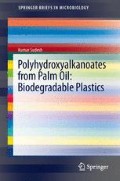Abstract
Polyhydroxyalkanoate (PHA) initially received serious attention as a possible substitute for petrochemical-based plastics because of the anticipated shortage in the supply of petroleum. Since then, PHA has remained as an interesting material to both the academia and industry. Now, we know more about this microbial storage polyester and have developed efficient fermentation systems for the large-scale production of PHA. Besides sugars, plant oils will become one of the important feedstock for the industrial-scale production of PHA. In addition, PHA will find new applications in various areas. This chapter summarizes the future prospects and the importance of developing a sustainable production system for PHA.
Access this chapter
Tax calculation will be finalised at checkout
Purchases are for personal use only
Author information
Authors and Affiliations
Corresponding author
Rights and permissions
Copyright information
© 2013 The Author(s)
About this chapter
Cite this chapter
Sudesh, K. (2013). Summary and Future Outlook. In: Polyhydroxyalkanoates from Palm Oil: Biodegradable Plastics. SpringerBriefs in Microbiology. Springer, Berlin, Heidelberg. https://doi.org/10.1007/978-3-642-33539-6_7
Download citation
DOI: https://doi.org/10.1007/978-3-642-33539-6_7
Published:
Publisher Name: Springer, Berlin, Heidelberg
Print ISBN: 978-3-642-33538-9
Online ISBN: 978-3-642-33539-6
eBook Packages: Biomedical and Life SciencesBiomedical and Life Sciences (R0)

